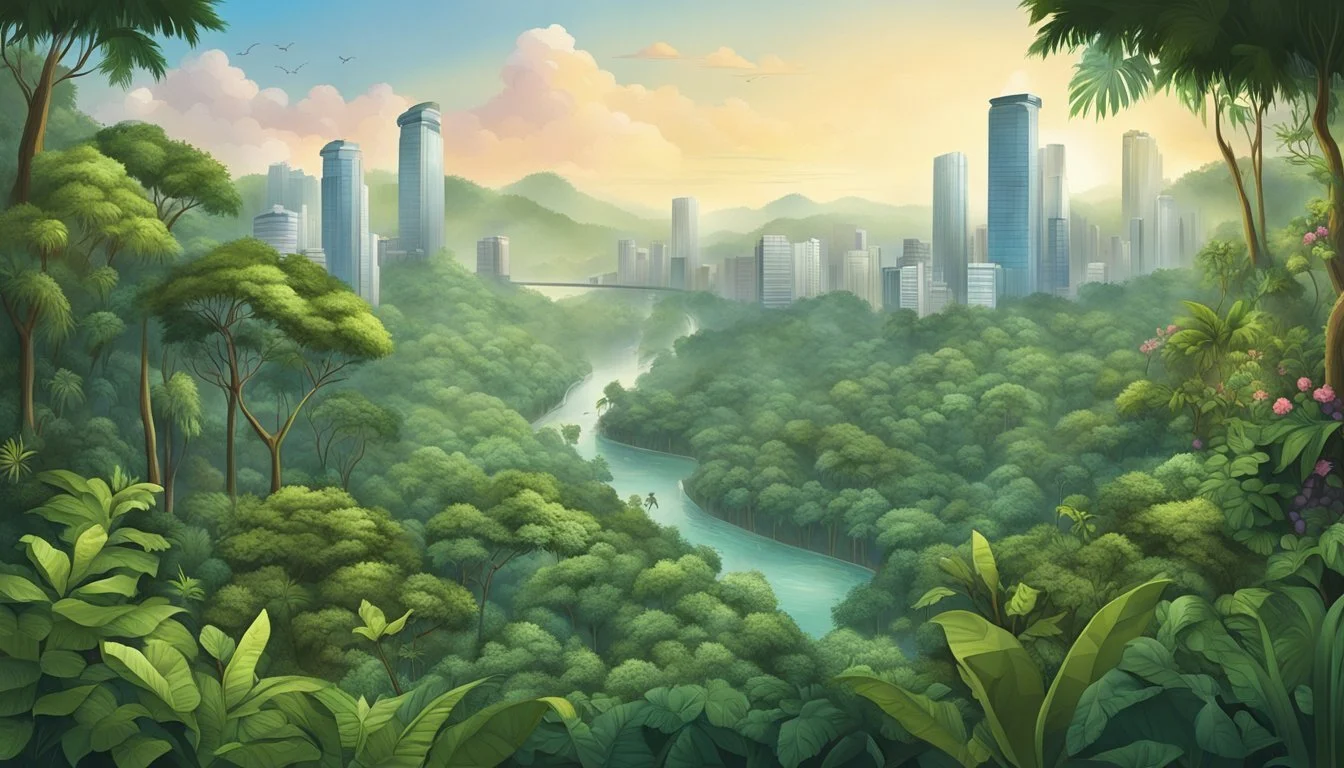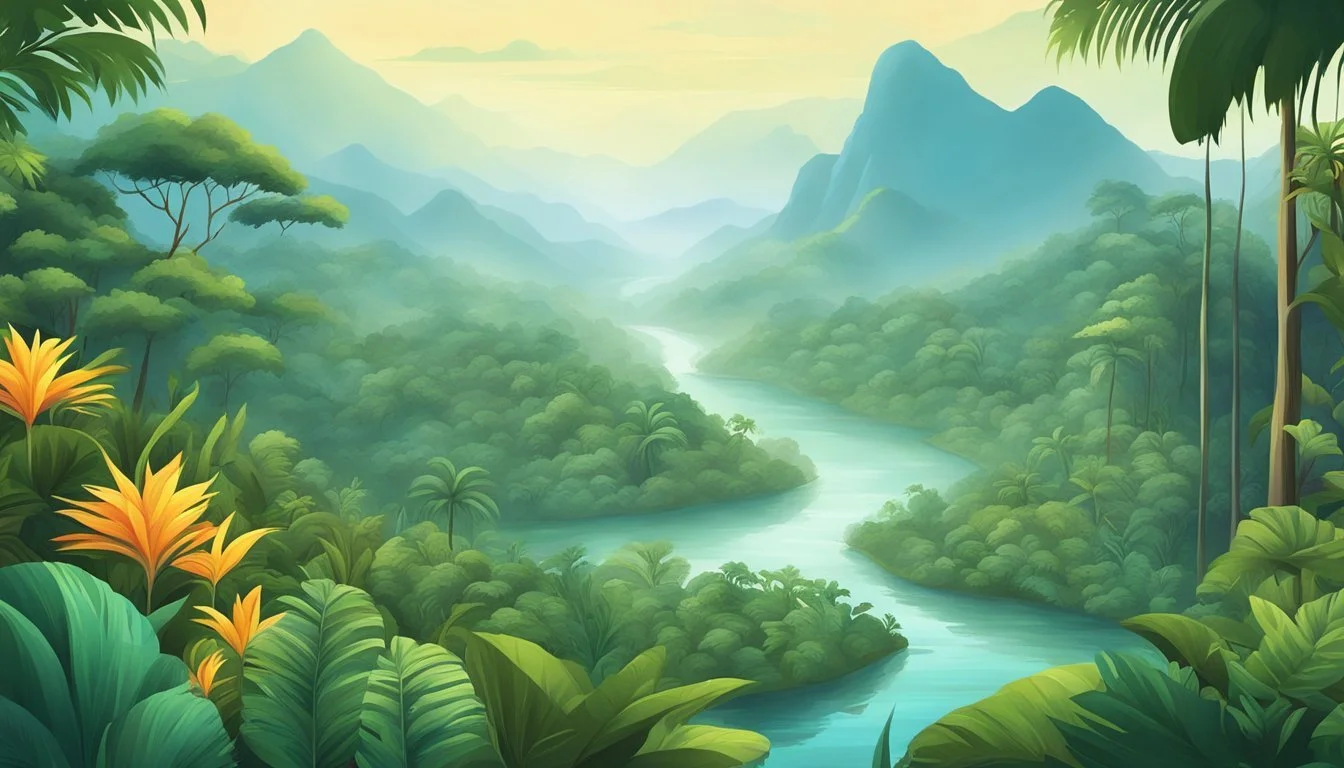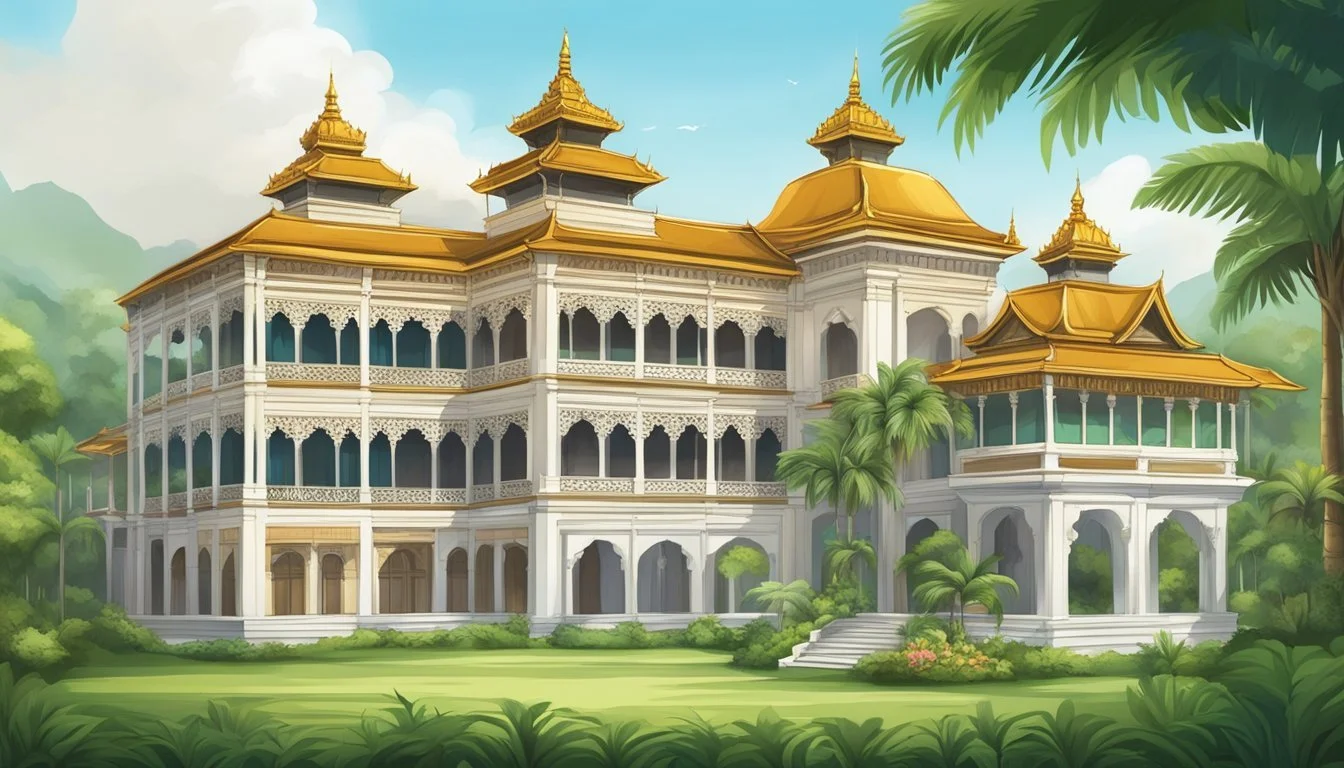10 Illuminating Documentaries About Malaysia
A Journey Through Culture and History
Malaysia's rich history and diverse culture make it a fascinating subject for documentary filmmakers. From its colonial past to modern political developments, the country offers a wealth of stories waiting to be told through the lens of cinema.
These documentaries provide viewers with unique insights into Malaysian society, politics, and environmental issues. They explore topics ranging from rapid urban development to historical figures and cultural traditions, offering a nuanced look at this complex Southeast Asian nation. Through compelling narratives and stunning visuals, these films invite audiences to deepen their understanding of Malaysia's past and present.
1) 'Raising the Red Lanterns: Malaysia at the Crossroads'
This documentary explores Malaysia's cultural tapestry through the lens of its Chinese New Year celebrations. It focuses on the tradition of hanging red lanterns, particularly in Jalan Raja Uda, Butterworth.
The film captures the spectacle of 10,000 red-silk lanterns illuminating this bustling street. It examines how this dazzling display represents both cultural preservation and adaptation in modern Malaysia.
Interviews with local residents and business owners reveal the economic and social impact of this annual event. The documentary also delves into the symbolism of red lanterns in Chinese culture and their significance in Malaysian society.
The filmmakers contrast the lantern festival with other cultural celebrations across Malaysia. This juxtaposition highlights the country's diverse heritage and the challenges of maintaining traditions in a rapidly modernizing nation.
'Raising the Red Lanterns' offers insights into Malaysia's ethnic relations and cultural integration. It presents a nuanced view of a country balancing tradition and progress, unity and diversity.
2) 'Tribal Traces: In the Heart of Borneo'
'Tribal Traces: In the Heart of Borneo' offers a captivating glimpse into the lives of indigenous communities deep within Borneo's rainforest. The documentary showcases the rich cultural heritage and traditional practices of tribes like the Penan and Dayak Iban.
Viewers are transported to remote villages where ancient customs still thrive. The film explores how these communities maintain a harmonious relationship with their environment, emphasizing their role in forest conservation.
One of the documentary's strengths is its portrayal of tribal elders passing down wisdom to younger generations. It highlights the importance of preserving traditional knowledge in the face of modernization.
The cinematography captures the lush beauty of Borneo's landscapes, from winding rivers to dense jungles. Intimate footage of daily tribal life provides an authentic representation of their unique way of life.
'Tribal Traces' also touches on the challenges these communities face, including threats to their land and resources. It presents a balanced view of the delicate balance between tradition and progress in the heart of Borneo.
3) 'The Malaya Emergency: A Hidden War Revealed'
This documentary sheds light on a little-known conflict that took place in British Malaya from 1948 to 1960. The Malayan Emergency pitted British colonial forces against communist guerrillas in the dense jungles of the Malay Peninsula.
The film explores the complex motivations behind the insurgency, including anti-colonial sentiment and the spread of communist ideology in post-World War II Southeast Asia. It examines the strategies employed by both sides during the protracted jungle warfare.
Archival footage and interviews with veterans provide firsthand accounts of the challenging conditions faced by combatants. The documentary also delves into the impact of the conflict on Malaya's diverse population, including ethnic Malays, Chinese, and Indians.
Viewers gain insight into the broader Cold War context of the Emergency and its influence on decolonization in the region. The film highlights the often-overlooked significance of this conflict in shaping modern Malaysia's political landscape.
Through its balanced presentation, 'The Malaya Emergency: A Hidden War Revealed' brings this crucial chapter of Malaysian history to light for contemporary audiences.
4) 'Kuala Lumpur: A Melting Pot of Cultures'
This documentary explores the vibrant cultural tapestry of Kuala Lumpur, Malaysia's dynamic capital city. It showcases the harmonious blend of diverse ethnicities that call this metropolis home.
Viewers are taken on a journey through the bustling streets, where modern skyscrapers stand alongside traditional architecture. The film highlights iconic landmarks like the Petronas Twin Towers and the historic Sultan Abdul Samad Building.
The documentary delves into the city's rich culinary scene, featuring local hawker centers and upscale restaurants. It demonstrates how food serves as a unifying factor among Kuala Lumpur's multicultural population.
Religious diversity is examined through visits to various places of worship, including mosques, temples, and churches. The film illustrates how these different faiths coexist peacefully within the urban landscape.
The documentary also explores Kuala Lumpur's entertainment and shopping districts, showcasing the city's blend of traditional markets and modern malls. It captures the essence of a metropolis where luxury and local charm intertwine seamlessly.
5) 'From Gua Tempurung to KL: Malaysia's Natural Wonders'
This documentary explores Malaysia's diverse natural landscapes, starting with the majestic Gua Tempurung. Located in Gopeng, Perak, this limestone cave formed over 250 million years ago is one of the largest in Peninsular Malaysia.
Visitors can embark on various cave tours, from casual walks to adventurous spelunking experiences. The cave's cool interior and impressive rock formations provide a stark contrast to the lush rainforests outside.
The film then journeys through Gopeng's thriving ecotourism scene, which began in the early 2000s. The town's natural beauty attracts adventure seekers and nature lovers alike.
As the documentary moves towards Kuala Lumpur, it showcases the unique blend of urban development and natural preserves. The city's green spaces, such as the KL Forest Eco Park, offer a refreshing escape from the bustling metropolis.
The film highlights Malaysia's commitment to preserving its natural wonders while embracing modernity. It captures the country's diverse ecosystems, from limestone caves to tropical rainforests and urban green spaces.
6) 'Batik: The Art of Malaysian Fabric'
'Batik: The Art of Malaysian Fabric' explores the rich heritage of Malaysian batik. This documentary showcases the intricate process of creating batik, a wax-resist dyeing technique used to decorate textiles.
The film traces batik's origins in Malaysia back to the 1920s, highlighting its development as a uniquely Malaysian art form. It examines the cultural exchanges that influenced batik's evolution over the centuries.
Viewers are introduced to skilled artisans who demonstrate traditional batik-making methods. The documentary captures the painstaking application of wax designs and vibrant dye colors that bring batik patterns to life.
Malaysian batik motifs often feature natural elements like fireflies, palm leaves, and ocean waves. The film illustrates how these designs reflect Malaysia's lush landscapes and diverse ecosystems.
'Batik: The Art of Malaysian Fabric' also explores batik's role in contemporary Malaysian society. It shows how the government has promoted batik as a symbol of national identity, encouraging its wear in professional settings.
The documentary presents batik as more than just fabric - it's a cultural touchstone that connects Malaysians to their artistic heritage. Through stunning visuals and expert insights, the film celebrates batik's enduring appeal and craftsmanship.
7) 'The Malaysian Royal Family: Beyond the Ceremonial Robes'
'The Malaysian Royal Family: Beyond the Ceremonial Robes' explores Malaysia's unique rotating monarchy system. This documentary sheds light on the country's constitutional monarchy, where nine hereditary rulers take turns as king every five years.
The film examines the roles and responsibilities of Malaysia's royal families, both at the state and federal levels. It offers viewers a rare glimpse into the lives of these royal households, their traditions, and their influence on Malaysian society.
Viewers learn about the Conference of Rulers, a body that elects the Yang di-Pertuan Agong (Supreme Head of State) from among the nine rulers. The documentary explains how this system balances power and preserves cultural heritage.
Recent royal transitions are highlighted, including the ascension of Sultan Ibrahim Iskandar of Johor as Malaysia's 17th king. The film discusses his background, wealth, and outspoken nature on political issues.
'The Malaysian Royal Family' also examines the monarchy's evolving role in modern Malaysia. It explores how these royal institutions adapt to changing times while maintaining their ceremonial and cultural significance.
8) 'Forests of Malaysia: Nature's Untold Story'
'Forests of Malaysia: Nature's Untold Story' offers viewers a captivating glimpse into the lush jungles of this Southeast Asian nation. The documentary showcases the rich biodiversity found within Malaysia's ancient forests.
Viewers are treated to stunning macro-photography that reveals the intricate details of the jungle's inhabitants. The film focuses on various species at different stages of their life cycles, providing insight into the complex ecosystem.
The documentary also highlights the importance of preserving these natural treasures. It explores the challenges faced by Malaysia's forests and the efforts being made to protect them for future generations.
Through storytelling and vivid imagery, the film brings attention to lesser-known aspects of Malaysia's jungle life. It introduces audiences to unique flora and fauna that call these forests home.
'Forests of Malaysia: Nature's Untold Story' serves as both an educational tool and a visual feast. It aims to inspire appreciation for the country's natural heritage and encourage conservation efforts.
9) 'Malaysia's Lost Tribes'
'Malaysia's Lost Tribes' is a compelling documentary that sheds light on the indigenous communities of Malaysia. It focuses on the Orang Asli, the aboriginal peoples of Peninsular Malaysia.
The film explores the challenges faced by these tribes as they struggle to maintain their traditional way of life. It highlights their fight for land rights and cultural preservation in the face of rapid modernization.
Viewers are taken on a journey into the rainforests of Malaysia, where many Orang Asli communities still reside. The documentary showcases their unique customs, traditional knowledge, and deep connection to the land.
'Malaysia's Lost Tribes' also examines the impact of deforestation and development projects on these indigenous groups. It presents interviews with tribal elders, activists, and government officials, offering diverse perspectives on the issues at hand.
The film serves as an important record of Malaysia's indigenous cultures, some of which are at risk of disappearing. It raises awareness about the need to protect these communities and their ancestral lands.
10) 'The Rise of Malaysian Cuisine: A Gastronomic Journey'
This documentary explores the evolution of Malaysian cuisine and its growing global recognition. It showcases the diverse culinary traditions that have shaped the country's food landscape.
Viewers are taken on a journey through Malaysia's vibrant food markets and bustling street food scenes. The film highlights the unique blend of Malay, Chinese, Indian, and indigenous Bornean influences that create Malaysia's rich gastronomic tapestry.
Prominent chefs and restaurateurs share their experiences in reimagining traditional dishes for modern palates. The documentary features innovative establishments like Beta, which combines heritage recipes with contemporary techniques.
Culinary tourism plays a significant role in promoting Malaysian cuisine internationally. The film examines how this trend has contributed to the country's gastronomic reputation.
From Kuala Lumpur's cosmopolitan offerings to Penang's renowned hawker stalls, the documentary showcases the regional diversity of Malaysian flavors. It also explores the use of local ingredients and cooking methods that define the nation's culinary identity.
The Impact Of Documentary Filmmaking In Malaysia
Documentary filmmaking in Malaysia has emerged as a powerful medium for cultural preservation and social commentary. It provides a platform for filmmakers to explore diverse aspects of Malaysian society and share untold stories with audiences.
Embracing Cultural Heritage
Malaysian documentaries play a crucial role in preserving and showcasing the country's rich cultural heritage. Filmmakers capture traditional practices, rituals, and ways of life that are at risk of being lost in the face of rapid modernization. These films serve as visual archives, documenting indigenous cultures, folklores, and historical events.
The Layar Liar Malaysia documentary series is a prime example of efforts to educate the public about Malaysia's biodiversity. It highlights the unique flora and fauna found in the country, raising awareness about conservation needs.
Highlighting Social Issues
Documentary films in Malaysia shed light on pressing social issues, sparking important conversations and driving change. They tackle topics such as environmental concerns, human rights, and urban development.
"Malaysia's Last Tiger" focuses on the critical need for tiger conservation, drawing attention to the species' declining numbers. Other documentaries explore the impact of rapid development on local communities and ecosystems.
These films serve as catalysts for social awareness, often leading to increased public engagement and policy discussions. They provide a voice for marginalized communities and bring hidden problems to the forefront of public consciousness.
Exploring Malaysian History Through Documentaries
Documentaries offer a compelling lens to examine Malaysia's rich historical tapestry. These films shed light on pivotal moments and transformative periods that have shaped the nation's identity and trajectory.
Colonial Influence And Resistance
British colonial rule left an indelible mark on Malaysia's development. Documentaries explore the complex relationships between colonizers and local populations, highlighting both cooperation and resistance. Films often focus on key figures like Tunku Abdul Rahman, who led the country to independence in 1957.
Some documentaries examine the lasting impact of colonial infrastructure and institutions. They showcase how British-style education, legal systems, and administrative structures influenced modern Malaysia.
Resistance movements feature prominently in historical documentaries. The Malayan Emergency (1948-1960) receives particular attention, with films detailing the communist insurgency and counterinsurgency efforts.
Modern Development And Challenges
Post-independence documentaries chronicle Malaysia's rapid modernization. They often highlight the country's economic transformation from an agricultural base to an industrial powerhouse.
Films explore landmark projects like the Petronas Towers and the development of Putrajaya as symbols of national progress. The role of leaders such as Mahathir Mohamad in driving Malaysia's growth is frequently examined.
Documentaries also tackle sensitive topics like racial tensions and political controversies. The events of May 13, 1969, and their aftermath are subjects of thoughtful analysis in several films.
Recent productions address contemporary challenges, including environmental issues, urban development, and the push for democratic reforms. These documentaries offer nuanced perspectives on Malaysia's ongoing evolution.








